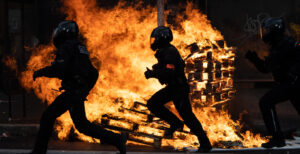This April, 27-year-old Abdelkarim was forced to leave his home in the Paris suburb of Île-Saint-Denis — a decrepit squat inhabited by more than 300 migrants, asylum-seekers and refugees like himself. “There were about 200 police. They told everybody: ‘Let’s go, let’s go, let’s go’,” recalls Abdelkarim, a native of Sudan, who has lived in France for the last three years. “They stopped buses next to the front door, and people got onto the buses.”
The buses took residents off to a slew of temporary shelters as far away as Toulouse. Abdelkarim was sent to a hotel in the town of Épinay-sur-Orge in the outer suburbs of Paris — though with a stay limited to just 15 days. “Two weeks later, we were on the street,” he says, searching for words in a language he is still learning.
Squats are not an uncommon sight around the French capital — a city whose average real estate prices tripled between 2000 and 2020, and which loses around 12,000 inhabitants every year largely due to its high cost of living. But this particular squat in Île-Saint-Denis — inside the abandoned property of cement producer Unibéton — had the misfortune of being located a quick stroll away from the Olympic Village. When the 2024 Paris Olympics kick off in July, this 52-hectare neighbourhood of glitzy residences will be filled with athletes and team officials — and thanks to the police intervention this year, VIP visitors will likely be spared the sight of migrants.
The prefecture of the département of Seine-Saint-Denis, which carried out the eviction, insisted it had nothing to do with the Olympics. But Faris Youss, a 31-year-old refugee from Chad who leads the activist group Réfugiés autonomes (Autonomous Refugees), rejects the official narrative. “The prefecture doesn’t want to own up to the reality,” Youss tells me. “We had meetings with elected officials from city hall, where it was said: ‘the Olympics are coming soon — you’re going to have to leave here.’”
Abdelkarim, along with dozens of former residents of Unibéton, has since moved to another squat in an industrial zone in the suburb of Vitry-sur-Seine, far away from the bright lights of Paris and the Olympic Village. When I visited in late November, I had a glimpse of the alarming conditions of this makeshift residence: a busted ceiling in the stairwell; bedrooms crowded with multiple occupants; limited common space overwhelmed by drying clothes; trash overflowing in dumpsters outside; a slew of space heaters to protect against the looming winter. Abdelkarim, who now sleeps in a roughly 15 square meter room with two other people, says: “The best solution is social housing. In Île-de-France, there’s a lot of people [who want it]. There aren’t many people who can get it.”
It all casts doubt on the notion that the eviction of the squat was somehow beneficial to the residents. “It didn’t resolve any problems in the long-run,” says Paul Alauzy, spokesperson for the group Le Revers de la Médaille, a coalition of prominent anti-poverty, migrants’ rights, and affordable housing groups critical of the Olympics. “What it did was cross off a location on the map for the prefecture and disperse 500 refugees across Île-de-France.”
The clampdown at Unibéton not only illustrates the staggering failures of the French state to welcome migrants and refugees — it is also symptomatic of another problem: the 2024 Summer Olympics threaten to aggravate Paris’s affordable housing crisis. Already, the Games are piling pressure on the housing market, affecting not just refugees, but also students and working-class residents.
In October, Le Revers de la Médaille published a harshly-worded public letter to the Olympic organising committee, warning against a “social cleansing” of the Paris region that would affect the homeless and others living on the margins. The coalition called for a better “handling of people in situations of precarity and exclusion before, during, and after the Games”. Meanwhile, in an interview with UnHerd, Alauzy lamented the recent installation of fencing around the Charles de Gaulle bridge in southeastern Paris, a spot frequently used by homeless people for shelter.
University students are also feeling the pinch. Earlier this year, the Paris affiliate of the Crous, a public institution that manages student housing, announced plans to seize flats during July and August 2024 to make way for Olympic volunteers and partners — thereby removing 3,000 students from their residences two months ahead of schedule. The ministry of higher education has promised a €100 cheque and two tickets to the Olympics to each student affected.
“It feels like a joke,” says Esther Laudet, spokesperson for the student union Solidaires. “I don’t think students care much about tickets to the Olympics. What students want are places to live, meals, and dignified conditions to study.” However, it is still unclear whether the plans will go through: Solidaires has filed lawsuits against Crous, with key decisions expected in the coming months, according to a lawyer involved in the cases.
If Crous does get its way, it will effectively force students into the punishing private sector, where they will have to compete with other low-income earners. “The reality is that students are accepting conditions that are pretty indecent because they don’t have the choice,” Laudet says. “In Paris, it’s impossible to find housing for less than €400 [a month]. Or at least, it’s really, really hard to do so.”
The problem is most acute around the Olympic Village, which sprawls across the three municipalities of Saint-Ouen, Saint-Denis and Île-Saint-Denis. Featuring scores of modern, environmentally-friendly flats to be converted into social housing after the Games, the Village represents the crown jewel of the organisers’ pledge to deliver a socially responsible Olympics. But it may well become a symbol of the emptiness of that promise.
The lead project developer has promised that at least 25% of the Olympic Village flats will be reserved for social housing. But that number isn’t nearly as generous as it sounds. For one thing, the pledge of 25% is in line with the minimums required by French law. The number also falls below the current rates of social housing in the cities of Saint-Denis and Saint-Ouen, former bastions of industrial workers long governed by the French Communist Party. Then there’s the fact that developers are yet to announce what type of social housing will be hosted: will it be reserved for low-income residents, who make up the majority of housing requests, or middle-income ones? “They don’t want to give the numbers,” says Cécile Gintrac, a Saint-Denis-based teacher and activist with the 2024 Olympics Village Committee, sounding exasperated because she has been asking for such details for years.
Meanwhile, the flats intended for the private sector are wildly more expensive than existing houses in the area. Vinci, one of the main developers in the Olympic Village, is already advertising flats at around €7,000 per square meter — roughly five times the median monthly household income of the département. “There are very few of these that are going to be accessible to residents of Seine-Saint-Denis,” Gintrac said.
Beyond the Olympic Village, Gintrac is also concerned about the Games constricting housing supply next summer — and in particular Airbnb swallowing up much-needed apartments as landlords pivot to more attractive sources of income. “These big events tend to result in reduced housing supply for the most precarious people and the number of available flats more generally in the private sector,” says Gintrac, pointing to this autumn’s Rugby World Cup.
While Airbnb has come under fire in Paris proper, it is rapidly expanding in the banlieues, which now account for roughly half of the flats rented out on Airbnb in the Paris region. A November report from researchers at the Université Paris Cité and the French National Centre for Scientific Research (CNRS) found that, from 2015 to 2022, the number of flats on Airbnb in Seine-Saint-Denis rose from 1,311 to 9,341. Will Airbnb continue its expansion here after the Games as landlords discover that short-term rentals can be more profitable than renting to financially-strapped tenants?
At the squat in Vitry-sur-Seine, the Olympics don’t appear to be viewed with any fondness. When I asked Abdelkarim about them, he shrugged his shoulders. “It’s a big festival, it’s good for France, it’s good for Paris, but for us…” He trails off.
That sense of ambivalence could turn to hostility if the ultimate legacy of the Paris Olympics comes to resemble that of its predecessors: low-income residents of Athens, Beijing and Rio de Janeiro all experienced well-documented forms of displacement, and even the 2012 Games — which were supposed to be different — failed to deliver on the ambitious vision of “social inclusion” promised in East London. Despite this grim record, French authorities still cling to the notion that the Paris version will somehow be exceptional. But the early signs aren’t encouraging: next summer’s spectacle may well reproduce an experience of urban exclusion that has become painfully ordinary.
Disclaimer
Some of the posts we share are controversial and we do not necessarily agree with them in the whole extend. Sometimes we agree with the content or part of it but we do not agree with the narration or language. Nevertheless we find them somehow interesting, valuable and/or informative or we share them, because we strongly believe in freedom of speech, free press and journalism. We strongly encourage you to have a critical approach to all the content, do your own research and analysis to build your own opinion.
We would be glad to have your feedback.
Source: UnHerd Read the original article here: https://unherd.com/




